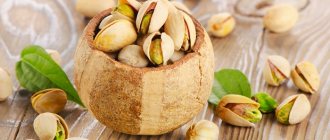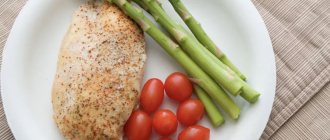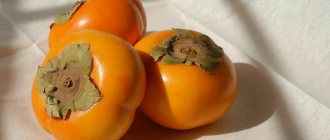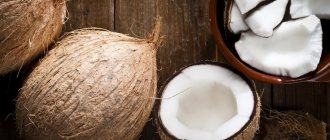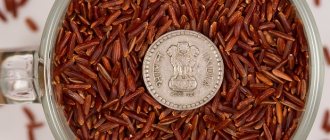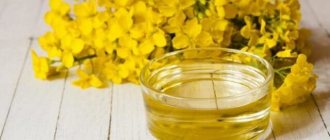© meteo021 — stock.adobe.com
Share:
Daikon is a white root vegetable that is popularly called Japanese radish. Large fruits weigh 2-4 kg and have rich taste. Juicy, delicate taste without bitterness. Unlike regular radish, daikon does not contain mustard oils. The product is widely used in oriental cuisine as a seasoning.
Thanks to its beneficial properties, the root vegetable has gained worldwide recognition. It contains many vitamins, enzymes and microelements necessary for human health. In folk medicine, white radish is also always popular. This ingredient is included in recipes for the treatment of many diseases and for general strengthening of the immune system.
How to choose a good vegetable
It must be cleared of soil so that the fruit itself can be seen ; the surface must be smooth, without wormholes or surface defects, and elastic.
If the product has not been transported and stored properly, it may wilt. It will be inconvenient to peel and difficult to grate.
The pulp will be dry, and since some of the moisture will evaporate, the bitterness contained in the root vegetable will appear more sharply.
There are no other requirements for root crops . It needs to be inspected in the same way as potatoes, cabbage, carrots, and beets are inspected.
There is no other way to evaluate the quality of a purchase, but an external inspection is often sufficient.
Comparison: which radish is healthier?
Daikon is popular in Russia for a reason. This productive, early-ripening vegetable has a more delicate taste compared to its relatives - radish and radish.
It has virtually no specific bitterness of many cruciferous vegetables. Daikon does not contain mustard oils.
Among all vegetables, only radish, daikon and horseradish can dissolve kidney and liver stones, but radish and horseradish have too strong a taste and not everyone can eat them. Daikon contains almost no spiciness and many people like it.
The pulp of this root vegetable (unlike radish and radish) does not become coarse as it grows, the slight pungency in young plants gradually disappears, and the vitamin C content increases.
All the benefits and possible harms of cauliflower, contraindications for consumption and delicious recipes are in our publication.
Are roasted sunflower seeds healthy? Find the answer to the question in this material.
This publication will tell you about the beneficial properties of figs for women.
Composition and calorie content, nutritional value, glycemic index
The calorie content of daikon radish is low - only 21 kcal per 100 g.
This volume will contain:
- 1.2 g proteins;
- 4.1 g carbohydrates;
- no fat.
The glycemic index of the vegetable is only 15 units.
Along with its low calorie content, it has a very healthy composition:
- abundance of fiber;
- glycosides;
- vitamins C (in large quantities), A, B, H, PP;
- essential amino acids;
- pectins;
- enzyme (enzyme) that promotes the digestion of starchy foods;
- bactericidal substances.
The “Live Healthy!” program will tell you about the health benefits of daikon radish and potential harm, calorie content and composition, beneficial properties and contraindications:
What are the health benefits?
The “big root” is capable of removing radionuclides from the body - this is why daikon radish is useful.
The combination in the edible part of the plant of glycosides, phytoncides and protein substances of a complex structure that inhibit the growth of bacteria, the ability to cleanse the kidneys and liver, and dissolve stones make it a valuable component of a natural health pharmacy.
This plant has a variety of effects on the body:
- calcium has anti-inflammatory and antioxidant effects, regulates blood clotting;
- B vitamins take an active part in metabolism and contribute to the comprehensive development of the fetus during pregnancy;
- Vitamin C, as a strong antioxidant, normalizes the body's defense systems;
- beta-carotene helps the eye muscle to be healthy and the body to get rid of toxins;
- iron can resist anemia;
- sodium regulates salt balance;
- iodine is important for thyroid health;
- selenium helps iodine look after the thyroid gland and resists oncology;
- Phosphorus is involved in the functioning of the heart muscle, nervous system, and brain activity.
General benefit
The beneficial properties of daikon for the human body are as follows:
- Positive influence on the nervous system.
- Improved attention and mental performance.
- Strengthening bones, hair, teeth, nails.
- Cleansing internal organs of harmful components. The vegetable also helps dissolve small stones and sand.
- Elimination and prevention of pathologies of the heart and blood vessels.
- Preventing the proliferation of pathogenic microorganisms.
- Antiseptic effect on the body.
- Strong antibacterial effect.
- Accelerates the liquefaction of sputum.
- Diuretic action.
- Reducing the risk of cancer.
- Fighting hunger.
- Improving metabolism and digestive process.
- Help in losing weight.
- Strengthening the immune system.
- Helps in skin whitening.
- Increasing the body's resistance.
- Fighting arrhythmia and tachycardia.
- Normalization of cellular structure.
- Cleansing the digestive tract.
- Increasing the content of beneficial bacteria in the intestines.
- Acceleration of wound healing.
Daikon is often included in diets and menus aimed at treating various diseases.
The vegetable helps to recover from diseases of the heart and blood vessels, liver, kidneys, bile ducts, and diabetes. It is also valuable for atherosclerosis and rheumatism.
Features of the effect on the body
This vegetable is not a magic wand that eliminates a lot of problems, but its regular inclusion in the diet gradually eliminates many diseases.
He does not hide individual dangers within himself; there are general contraindications.
The main thing is moderation , because the taste of Japanese radish, although mild, still belongs to the cruciferous family, many of which are not easy food for weak stomachs.
For adult men and women
The beneficial properties of the vegetable help both sexes.
The antibacterial and antiviral effects of phytoncides will support health during epidemics and seasonal colds, and in case of respiratory illness it will help you recover faster.
Why daikon is beneficial for the body of men and women: with regular consumption of this vegetable, libido increases in representatives of both sexes, and potency increases in men .
Scientists explain this by saying that the body is cleansed, clogging elements are removed, and vitality increases.
Therefore, the daikon, although somewhat indirectly, protects the health of women and men, and even makes a feasible contribution to improving family relationships.
For pregnant and lactating women
Daikon is an excellent diuretic . The potassium salts it contains help remove excess fluid from the body, which is important for women in a position where edema becomes a constant companion of pregnant women.
Along with excess fluid, waste and toxins are removed from the body.
Like other cruciferous vegetables, Japanese radish is a source of calcium, and supporting the skeletal system and teeth is very important for a pregnant woman.
Indeed, during this period, her body shares nutrients and structural substances with the growing fetus.
For children
You can give your child a taste of daikon no earlier than he turns 3-4 years old .
This environmentally friendly root vegetable, which does not absorb heavy metal salts from the soil, deserves to become part of the daily children's diet.
You should not force your child to eat daikon: this is not the only healthy vegetable that you can purchase or grow in your garden beds.
If your baby likes juicy white radish, you need to make sure that he doesn’t overeat and doesn’t fill his intestines and stomach with too much fiber.
A few slices a day will be enough. Kids like salads and just pieces of fresh vegetables cut from root vegetables.
Contraindications for use are prohibitions from the attending physician in case of health problems that are incompatible with the use of daikon.
On the advice of a specialist, the presence of white radish in the diet of a small family member is minimized or completely eliminated.
For the elderly
Due to the abundance of fiber, older people should eat daikon carefully . Digestion weakens with age, and diseases appear.
But there is an alternative - instead of daikon pulp, you can use its juice. This is a mild laxative and diuretic, which will be a valuable quality for older people.
It would be good if they could replace some of the daily pills with a natural product. For those who regularly drink daikon juice in the evening, the intestines are easily cleansed naturally in the morning.
Benefits for women
Vegetables
Daikon is beneficial for both sexes. It helps women lose weight and maintains the beauty of their skin and hair.
In addition, there are benefits for pregnant and lactating women. The potassium in the composition prevents swelling, which often occurs in expectant mothers. Radish reduces the likelihood of toxicosis. It also saturates the body of the mother and fetus with the necessary calcium and B vitamins. And selenium helps prevent pathologies in the unborn child.
Potential danger
The danger lies not so much in the product as in its excessive consumption.
A possible problem is the abundance of fiber in the composition .
Because of this, daikon is not recommended for people with diseases of the stomach and intestines during an exacerbation, and during remission the vegetable is consumed in small portions, finely grated or heat-treated.
Direct contraindications are only peptic ulcers and acute gastritis. It is also contraindicated for gout, problems with the thyroid gland, and urolithiasis.
If you have the listed and associated diseases, you can include the product in your diet only after consulting a doctor .
What are the health benefits of peach? Read our article!
You can learn about the beneficial properties of chicken liver from this material.
The medicinal properties and contraindications of the herb called mint are discussed in this publication.
With a Far Eastern accent
So, daikon, that is, “big root,” if the name is translated from Japanese. This is a root vegetable belonging to the cabbage family (subspecies - radish).
The story of his birth is interesting. It turns out that Japanese farmers managed to obtain daikon in the distant past through a kind of selection from the Asian radish - lobo, which grew in the territory of modern China. Therefore, it is quite natural that today daikon is popularly called Japanese or Chinese radish.
According to statistics, daikon now occupies a leading position in Japan among all vegetable crops, and is also a daily vegetable dish in the diet of the Japanese family.
In addition, Japanese radish is now actively grown in the countries of Southeast Asia, Europe, and America. In recent years, Russian amateur gardeners have also appreciated daikon, which is not at all surprising.
Recommendations for preparation and use
The vegetable is consumed fresh . In our country, it is customary to serve it by peeling the skin, grating it on a fine grater, lightly seasoning it with vegetable oil and adding salt. In Japan, it is stewed, boiled and even dried.
If the root vegetable is too large, you can cut off part of it and use it for food, and store the rest in a plastic bag in the vegetable compartment of the refrigerator. It can be kept this way for up to 2 weeks.
Daikon is gaining popularity because it lacks the harsh bitterness of radish. The healthiest thing is to eat it fresh , but you can stew it, season soups with it, pickle it, pickle it.
Salads made from this root vegetable go well with starchy foods, since daikon contains an enzyme that promotes the breakdown of starches in the gastrointestinal tract.
There are no components in the vegetable pulp that can cause allergies , so dishes with its addition are well tolerated by many, unless there are other contraindications.
The abundance of fiber and low calorie content make Japanese radish an ideal product for those who want to lose weight.
In cooking
There are several dozen salads with daikon alone. It is combined with herbs and other vegetables , walnuts, pears, apples, honey, sesame seeds, cottage cheese, and boiled eggs.
The dressing for such salads is made with sour cream, lemon juice, mayonnaise, vegetable oil, vinegar, and soy sauce.
If a whole vegetable can be stored in the refrigerator for a long time, then it is better to eat the grated one immediately , because when combined with salt, it soon leaks juice and the salad becomes watery.
Here are some simple dishes that feature this white root vegetable as one of their ingredients.
Sandwich with caviar . Cut two thin circles from the peeled vegetable, layer them with cod roe. The result is an original appetizer that can decorate a buffet table.
Chinese soup . Bring chicken broth (2 cups) to a boil and add 75 g of grated daikon for Korean carrots.
Reduce heat so that the liquid simmers slightly, leave for 5 minutes, add salt and pepper, pour into a serving plate, add a spoonful of sesame oil and half a stalk of leek cut into strips.
Salad with tuna . Grate the daikon on a coarse grater, mix with chopped parsley, mash, drain off excess moisture, add a third of a can of canned tuna, chopped with a fork.
Pour in the sauce mixed from a tablespoon of white wine vinegar, a teaspoon of sugar, 2 teaspoons of olive oil, 2 g of ground pepper.
This healthy vegetable can be used as a side dish for fish, preferably fresh, because heat treatment reduces the amount of nutrients in the product.
Young leaves can be used in salads: they have a high content of vitamin C.
Japanese salad with daikon, video recipe:
For weight loss
Although you won’t be satisfied with just daikon, overweight people can include it in their diet as a substitute for more high-calorie dishes.
Fiber and microelements will provide the body with support and cleansing , and at the same time eliminate bad cholesterol.
An excellent detox remedy would be white root juice .
Drinking half a glass after dinner can stimulate weight loss by removing excess fluid from the body, allowing easy bowel movements, and getting rid of bad cholesterol.
Those who want to lose weight are recommended to use the following cocktail : grind Japanese radish and fresh cucumber taken in equal proportions in a blender with the addition of parsley to taste.
This thick drink not only stimulates metabolism, but also removes harmful substances from the body.
For the treatment of diseases, in folk medicine
Root vegetables are very juicy, so extracting juice from them is not difficult. The folk hospital offers recipes that use the pulp and juice of the plant.
For arrhythmia, grate the Japanese radish, add granulated sugar and wait until the juice is released. It should be taken before meals, a tablespoon three times a day.
For diabetes, peel a small piece of root vegetable, squeeze out the juice, pour into a glass jar, and store in the refrigerator for no more than a day. Throw out any unused remains and make a new batch.
Take 2 tbsp. spoons three times a day after meals. Recommended for getting rid of bad cholesterol and maintaining blood glucose levels at the required level.
To speed up the process of liquefying mucus, drink 50 g of root juice three times a day, mixing it with honey. This drink will also help you get rid of viruses and bacteria more effectively and strengthen your respiratory system.
For anemia, grate carrots, beets and Japanese radishes, mix, place in the oven at the lowest temperature for three hours.
Give children a teaspoon of the mixture twice a day before meals, adults - a tablespoon three times a day. The course is at least 2 months.
Growing daikon
This root vegetable can be easily found on store shelves and markets. But everyone knows that home-grown vegetables will be much healthier than store-bought ones. Growing vegetables will undoubtedly appeal to everyone. Planting and caring for vegetables will not be any particular difficulty, since this vegetable crop is quite unpretentious. The only difficulty may be that not everyone is able to correctly calculate the time when to plant daikon. It can be planted both in the second half of summer and in spring. In summer, it is recommended to plant daikon in the middle zone.
There are a number of rules and recommendations that must be followed to ensure that the harvest is rich, tasty and truly healthy:
- soil preparation;
- sowing;
- watering;
- harvesting;
- storage.
First of all, it is important to properly prepare the beds. Although this plant is not particularly whimsical and grows quite well on various types of soil, it still loves loose soil. Therefore, before planting, the ground needs to be dug up and leveled. In order for the root crops to grow large, it is necessary to dig deep holes (about 10 cm) before planting. The distance between the holes should be sufficient (approximately 5-7 cm). The vegetable seeds are quite large, so they will sprout without problems. When to sow seeds in open ground? The ideal time to plant Japanese radish is April. One seed is planted in one hole, after which the soil must be moistened and covered with earth. To prevent slugs from appearing, the surface of the bed must be treated with ash. After thinning, the daikon should be fed with fertilizers. Only seedlings with a rounded root shape can be replanted.
Since root crops must remain in the soil until mid-September, they need additional watering. If there is a drought outside, then the daikon needs to be watered when the soil becomes dry. Abundant watering is not required, so if it rains, then nothing is needed from a person.
The fruits are collected until the end of September. Digging up daikon is not easy, but you can dig up the whole fruit only if you take your time. The planted root crop blooms and produces seeds. In order for vegetables to be preserved for a long time, they need to create special conditions. The air temperature in the place where the vegetable lies should be from -1 degrees to 5. It is recommended to store daikon in boxes with dry sand.
Plant pests are very similar to cruciferous diseases. It is difficult to fight them, but it is possible. First of all, you need to adhere to all the rules of agricultural technology: remove weeds, disinfect places where vegetables and garden tools will be stored, clean the area from plant debris. Some diseases are destroyed by chemicals. As a last resort, you can sprinkle the vegetables with them.
